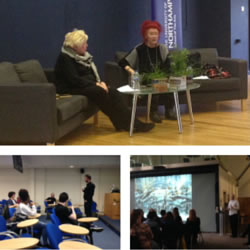Subject Futures Week 2016: Music, literature and fine art were the mid-week focus
Date 29.01.2016
29.01.2016
The third day of Subject Futures Week has bought many more of the industry’s good and great to the School of The Arts.
Contemporary artist Claude Heath gave a talk to a packed-out Newton Grand Hall about his drawings and what inspired him.
Music students had the opportunity to hear from Dan Moore about the British Academy of Songwriters, Composers and Authors (BASCA) and how it exists as the voice for music writers.
He talked the students through the work the academy does, how it is funded and how it hosts three annual music awards ceremonies; the British Composer Awards, the Gold Badge Awards and the Ivor Novello Awards. He said: “The music industry is built solely on songs and without these there’s no foundation to build on. This is why it is so important to support songwriters and make sure their work is recognised and that essentially they’re making a decent enough living.”
He also gave an overview on the music industry and how much it has changed in the past 30 years as it has moved from analogue to digital. He explained that when he started out in the mid-1990s, when Brit Pop was at its peak, the only way he could scout for bands was by listening to cassette after cassette and driving around the country to live gigs. He said: “That’s all we had to go on back then! Sometimes I would drive for miles to see a band, only to be disappointed. Now musicians have a whole host of platforms to showcase their music on.”
Dan also touched on how the record industry has had to adapt, particularly after the launch of Napster in 1999. He also talked about how iTunes has devalued music by pricing it so low and because of this, the industry has had to change its whole business model.
His advice to students was simple: “The most important thing you can do is get out there and meet as many people as you can at gigs and events. Getting ahead in this industry definitely stems from networking and building up contacts.
“Today’s budding musicians have an advantage as they have so many platforms available to them and can find their own audience anywhere in the world.”
The highlight for the English and Creative Writing students was being able to sit in on a conversation between renowned authors, Fay Weldon and Carole Hayman.
As the two have known each other for around 40 years, they each had plenty to say on how to become a versatile writer and survive and prosper in a changing world. Fay, bought up in New Zealand and from a family of authors, often had a differing opinion to Carole, who started off as an actress and actually appeared in one of Fay’s plays.
Fay said: “Writing isn’t a mysterious craft. You just work with what you have. It was a lot easier for writers when I started out 50 years ago, purely because there weren’t that many of us. When people ask me where I get my ideas from, I have to be honest and say from everywhere. A lot of my work is trying to make other people think what I think. If you have something of yourself in your writing, you are giving it a voice instead of having to borrow one.”
However Carole had another view when it comes to borrowing other people’s ideas. She said: There’s a huge difference between ripping someone else’s idea off and borrowing a notion and putting your own take on it.”
They both agreed that it’s OK to recycle work. Carole described a piece of advice that Fay once gave her as if your work gets rejected the first time, put it in the bottom drawer and revisit it a year later. It could then become a poem, article, TV series, novel or play. She said: “Don’t be shy about recycling your work. Just because it doesn’t fit one platform doesn’t mean it can be used for something else.”
To keep up to date with the buzz surrounding Subject Futures Week, use the #SFW2016
—
Pictured clockwise from top left: Claude Heath, Dan Moore and Fay Weldon with Carole Hayman